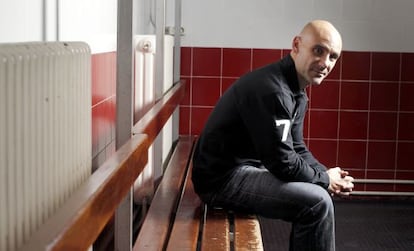Too old for a 900,000-euro contract
Former Rayo midfielder had agreement slashed by a court at club’s behest

A mercantile court decision in Madrid has achieved what dozens of years of history had failed to hammer home: the salary of a professional soccer player can be subject to logic that exceeds the mere pursuit of lucre for all involved. Ruling in the case of former Rayo Vallecano midfielder José María Movilla, the magistrate gave legal validity to a theory; that the level of performance of a professional athlete falls as age increases, an area of the field that even the most eminent physiologists cannot find common ground upon.
In its decision, the court reduced Movilla's salary from 900,000 euros to a little over 300,000, despite the player's presence last season in all 38 of Rayo's league fixtures.
On February 15, 2011, Movilla renewed his contract with the club, which was at that time in dire financial straits and in serious danger of going under. Player and club made a deal: if Rayo achieved promotion to Primera División, Movilla's contract specifications from 2009 would be activated again — 900,000 a year plus variables for the number of games played and objectives, as well as a monthly living allowance.
A few months later, Rayo faced an embargo on its ticket sales and television revenues, owed its players months of back salary and was unable to pay either taxes or social security contributions. The club entered bankruptcy proceedings and handed itself over to the receivers.
When the 2011-12 season got underway, Rayo's receivers decided to contest Movilla's contract on the basis it was "a substantial liability" and an "unjustified expense."
"The circumstances were not the same as when the 2009 contract was extended, neither were those of the player, who was 36 years old," the club claimed. The court upheld the plaintiff's suit and annulled the previous contract agreement, setting Movilla's salary at 327,589.26 euros. This figure was not arrived at arbitrarily; it is the average salary documented in a Professional Football League (LFP) report for a player of 36 years or over at a club with a budget equivalent to Rayo's. The amount was agreed by Pedro Bravo, a player agent who was also the representative of then-Rayo coach José Ramón Sandoval, and a member of the LFP's assessment committee.
Movilla, who currently plays for Zaragoza, also a Primera División side, was not aided by the testimony of his star witness, Rayo sporting director Felipe Miñambres, or by the performance of Rayo's club lawyer, Javier Tebas.
Miñambres denied that there was a correlation between the value of the buy-out clause in a contract and the value of the player, one of the few arguments Movilla presented to justify the value of his agreement. "Practically all the players have the same buy-out clause," said Miñambres, "and we knew that we were not going to be able to sell the player."
Furthermore, Miñambres presented a report, which was supposedly drawn up in Movilla's defense, which alluded to "the loss of physical condition and speed of the player."
Tebas, meanwhile, who is a former vice president of the LFP, the body that valued Movilla at a third of the amount that Rayo did in the player's contract, tacitly accepted that the club had acted "in bad faith" and "in the knowledge of the insolvency \[of the club\] and the awareness that it could be detrimental to or negatively affect the interests of other creditors."
Tu suscripción se está usando en otro dispositivo
¿Quieres añadir otro usuario a tu suscripción?
Si continúas leyendo en este dispositivo, no se podrá leer en el otro.
FlechaTu suscripción se está usando en otro dispositivo y solo puedes acceder a EL PAÍS desde un dispositivo a la vez.
Si quieres compartir tu cuenta, cambia tu suscripción a la modalidad Premium, así podrás añadir otro usuario. Cada uno accederá con su propia cuenta de email, lo que os permitirá personalizar vuestra experiencia en EL PAÍS.
¿Tienes una suscripción de empresa? Accede aquí para contratar más cuentas.
En el caso de no saber quién está usando tu cuenta, te recomendamos cambiar tu contraseña aquí.
Si decides continuar compartiendo tu cuenta, este mensaje se mostrará en tu dispositivo y en el de la otra persona que está usando tu cuenta de forma indefinida, afectando a tu experiencia de lectura. Puedes consultar aquí los términos y condiciones de la suscripción digital.








































